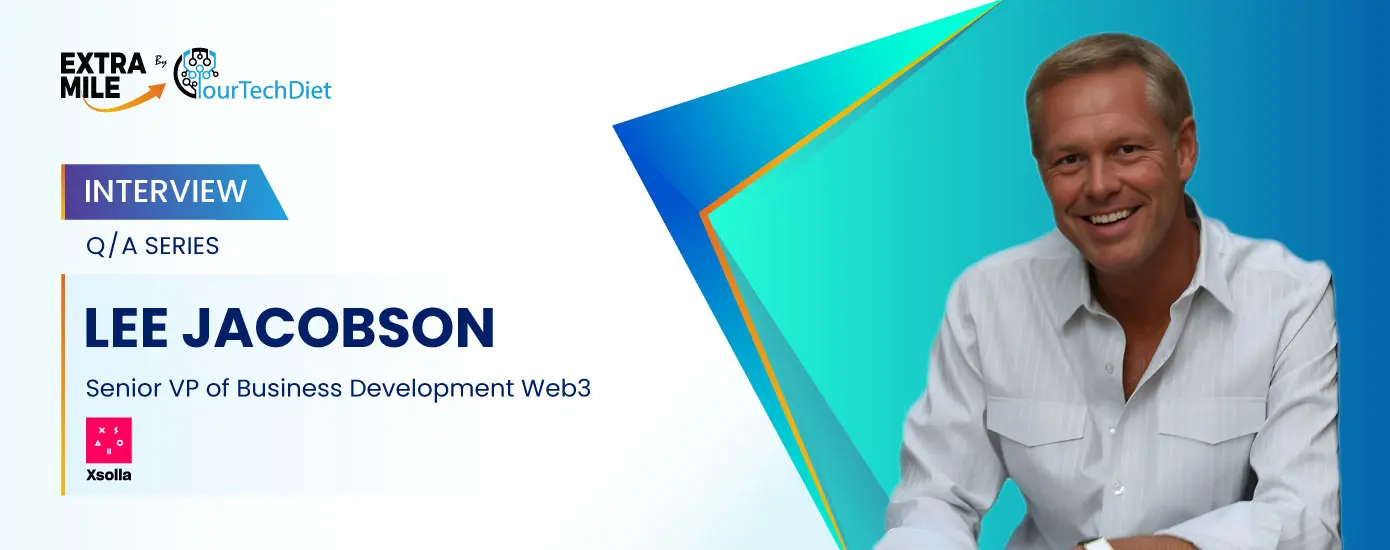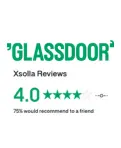Welcome to another exciting episode of ExtraMile by YourTechDiet!
Today, we are glad to host Mr. Lee Jacobson, Senior Vice President of Business Development Web3 at Xsolla, a leading game commerce platform provider company. Step into the dynamic world of gaming with a major focus on the transformative effects of Web3 technologies. Lee shares his journey from programming games on an Atari to evolution in the gaming industry and the growth into a dynamic and vibrant ecosystem.
Take insights on how Blockchain, NFTs, and decentralized economies represent a new frontier for game development, distribution, and experiential levels.
Join us in this talk as we explore aspects of the future of gaming, the challenge of global distribution, and the importance of education in embracing Web3.
Let’s dive right in!
Hello Lee! Hope you are doing well!
1. What inspired you towards the gaming industry, and how has the industry evolved since then?
Ans: My inspiration came from programming games on my Atari computer during its early days, which was both a challenge and a creative outlet. The thrill of building something interactive and entertaining fueled my passion. Over the decades, gaming has evolved from simple pixel graphics and offline experiences to hyper-realistic visuals and immersive online ecosystems. Technologies like blockchain and Web3 are ushering in a new era, shifting the focus toward ownership, decentralized economies, and community-driven development, transforming gaming into a platform for global interaction and cultural expression.
2. What excites you most regarding the potential of Web3 in reshaping the development, distribution, and play process of games?
Ans: Web3 is changing the rules of the game. Its potential lies in empowering developers and players by decentralizing control and creating ecosystems prioritizing ownership and transparency. With features like the Digital Backpack, Xsolla ZK enables players to own their in-game assets and carry them across platforms. This elevates the player experience beyond individual games to a broader gaming universe. Web3 facilitates sustainable economies for developers, leveraging blockchain for secure transactions, scalable networks, and lower costs. This technological leap offers new opportunities for monetization and player retention.
3. How do you believe technologies like NFTs and blockchain economies can unlock new revenue streams for game developers, especially those working on more modest budgets?
Ans: For smaller developers, NFTs and blockchain economies are game-changers. They provide access to new monetization models without needing massive upfront investment. NFT Founder Packs, for instance, can generate early revenue by offering exclusive items to players who support the game pre-launch. Additionally, features like Retro Mint allow developers to create tokenized assets from player achievements or legacy items, which players can trade or sell, extending the game’s lifecycle. These technologies democratize the revenue process, giving indie developers a competitive edge in a crowded market.
4. Would you describe how Xsolla ZK and its integration with Ethereum Layer 2 technology are changing the interaction between game developers and players regarding their usage of digital assets?
Ans: Xsolla ZK is redefining digital asset interactions by leveraging Ethereum Layer 2 technology through ZKsync’s Elastic Chain. It combines scalability, security, and affordability, allowing developers to integrate blockchain solutions seamlessly into their games. The Digital Backpack is a centerpiece of this innovation, giving players control over their in-game items and allowing them to use these assets across multiple games. Developers benefit from a cost-effective system that enhances engagement and retention while reducing operational complexity. This mutual benefit bridges the gap between traditional gaming and the future of decentralized ecosystems.
5. What will the future look like for in-game purchases and virtual goods? How will your platform be involved in this?
Ans: The future of in-game purchases lies in creating persistent value and interoperability. Players will no longer view virtual goods as disposable items tied to a single game but as assets that hold intrinsic value and are transferable across platforms and titles. Xsolla ZK is at the forefront of this transformation, offering tools like the Digital Backpack and NFT-based monetization options. These solutions help developers design robust economies where virtual goods enhance gameplay and the player experience. This evolution will deepen player loyalty and redefine how games are monetized.
6. What are the major challenges in global distribution, payment methods, and compliance, and how do you address these challenges?
Ans: Global distribution and compliance challenges often stem from the fragmented nature of payment systems and regulations across regions. For instance, blockchain-based payments face scrutiny due to varying legal frameworks. Xsolla addresses these hurdles by providing compliant, globally accessible payment solutions like Wallet as a Service (WaaS), ensuring seamless asset management for players while maintaining regulatory standards. Additionally, our blockchain infrastructure enhances transparency, builds stakeholder trust, and minimizes friction in global operations.
7. How do you help developers and players understand Web3’s benefits, especially regarding blockchain and decentralization?
Ans: Education and simplicity are key. For developers, Xsolla ZK provides EVM-compatible tools that integrate blockchain with minimal technical barriers, allowing them to experiment and adopt Web3 solutions confidently. For players, showcasing practical benefits like true ownership of assets, seamless interoperability across games, and the ability to trade items reinforces the value of decentralization. Focusing on use cases like the Digital Backpack and Retro Mint makes Web3 benefits tangible and accessible, creating a foundation for broader adoption.
8. What trends do you think will continue in the gaming industry in the coming years? How do you lead ahead of those trends?
Ans: Due to their accessibility and convenience, mobile and cloud gaming will remain dominant. Meanwhile, Web3 and AI will redefine gaming experiences, offering personalized and dynamic storytelling. To stay ahead, Xsolla focuses on providing developers with scalable, blockchain-backed solutions that future-proof their games. Features like cross-game interoperability and play-to-earn mechanics ensure developers can meet evolving player demands while capitalizing on emerging trends.
9. How do you see legal and regulatory frameworks evolving around blockchain and NFTs in games, and what can developers do to stay ahead of challenges?
Ans: The legal landscape around blockchain and NFTs is still maturing, with governments exploring frameworks to ensure transparency and prevent misuse. Developers must stay informed and work with partners like Xsolla to navigate these complexities. Our platform incorporates compliant solutions that allow developers to adopt blockchain technology securely. Building trust through transparent practices, adhering to regional regulations, and collaborating with industry leaders will help developers avoid legal challenges.
10. What makes a partnership in the gaming industry truly successful? Can you share some examples?
Ans: A successful partnership is built on aligned goals, mutual trust, and innovation. For example, Xsolla’s collaboration with ZKsync reflects a shared vision of scalable, secure, and accessible blockchain gaming solutions. This partnership enabled the development of Xsolla ZK, bridging the gap between developers and Web3 technology. Partnerships like these create new opportunities for developers and set industry benchmarks, fostering long-term growth and innovation.
11. What advice would you give to aspiring entrepreneurs or developers looking to break into the industry today?
Ans: My advice is to embrace adaptability and curiosity. The gaming industry evolves rapidly, and understanding emerging technologies like blockchain and AI is essential. Focus on building strong networks and learning from industry veterans. Equally important is maintaining a player-first mindset, as understanding and addressing player needs is the cornerstone of success. Lastly, don’t hesitate to experiment and iterate—innovation often comes from taking calculated risks.
Explore Our Other Insightful Interviews:



